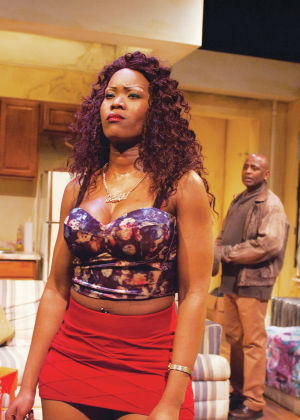
"There's nothing sentimental about a dead revolution!," snaps the heroine of Sunset Baby, thereby refuting our presumptions of youth as starry-eyed romantics. Her assessment arises from a childhood overshadowed by a father imprisoned for crimes committed in the name of Black-power separatism during the 1960s, and a mother whose grief drove her to addiction. Their embittered offspring is currently occupied with financing her education by dealing drugs in partnership with the likewise ambitious Damon, whose progress within the "underground economy" recalls the masculine posturing of a previous generation. In 1776, Abigail Adams—a wife with no small experience in the founding of nations—entreated her husband to remember "the ladies" in his quest for a better world, but writers for whom liberation exists in more-recent memory are once again exploring the price of freedom suffered by families bereft of domestic tranquility in service of an often-undefined philosophical manifesto. To be sure, former firebrand Kenyatta X retains no illusions regarding his ill-starred crusade; he now seeks only to atone for the pain inflicted upon his abandoned kin. His equally disillusioned daughter rejects his attempts at reconciliation, denying him the letters penned by her mother to the incarcerated spouse now dubbed a "political prisoner" by historians also coveting the epistolary artifacts. A home-videotaped confession of paternal culpability, however, moves Nina to reconsider the benefits of a Bonnie-and-Clyde future with her swaggering consort. Nina's decision to forsake Damon comes as no surprise, since we have already seen her plans for a solitary getaway, even as she plays along with her boy toy's street-culture fantasies. Generating more suspense is the fate of the precious correspondence that she could surrender to scholarship, sell to the highest bidder—or offer her remorseful sire for his private solace. What most commands our scrutiny, though, is the question of whether our fiercely independent protagonist will capitulate to popular convention and dedicate herself to the nursing of fragile male egos, or contrive a solution bringing satisfaction (or, at least, no irreparable damage) to all. When the mission proves victorious, reparations are easily negotiated, but playwright Dominique Morisseau's willingness to explore the legacy of lost causes marks her as a refreshingly original voice in a genre too often mired down in preconceived platitudes. This refusal to traffic in stereotypes is echoed in Ron OJ Parson's direction of the three talented actors assembled for this Timeline Theater production, whose uniformly focused intensity keeps our attention riveted through the performance's entire 110 minutes.
